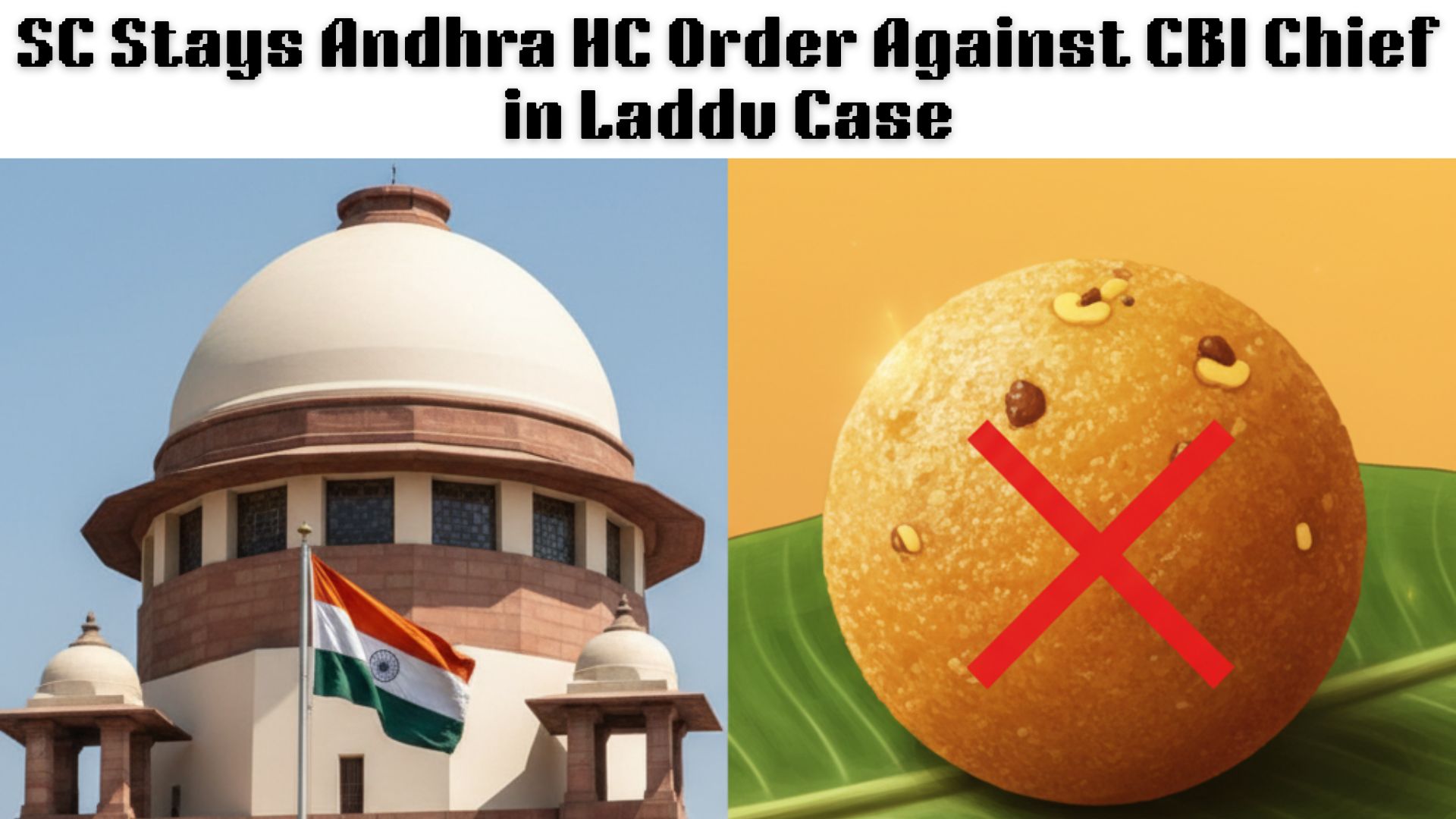
Supreme Court Stays Andhra High Court Order Against CBI Chief in Tirupati Laddu Adulteration Probe
CJI B.R. Gavai-led bench says SIT can delegate tasks under CBI Director’s supervision
Row over alleged adulterated ghee in Tirumala temple prasadam continues amid legal scrutiny
By Our Legal Correspondent
New Delhi: September 27, 2025: The Supreme Court of India has stayed an order of the Andhra Pradesh High Court that had faulted the Central Bureau of Investigation (CBI) Director for allowing an officer, not formally part of a court-constituted Special Investigation Team (SIT), to participate in the probe into allegations of adulterated ghee used in the preparation of the world-famous Tirupati laddus.
A bench led by Chief Justice of India B.R. Gavai, along with Justices K. Vinod Chandran and N.V. Anjaria, passed the interim order on September 26, 2025, while hearing a plea filed by the CBI Director challenging the High Court’s findings.
Background of the Case
The controversy dates back to 2024, when allegations surfaced that animal fat was being mixed with ghee used in preparing the sacred laddu prasadam at the Tirumala Tirupati Devasthanams (TTD).
Given the religious sensitivity of the issue, the Supreme Court itself had constituted a Special Investigation Team (SIT) to ensure impartiality. The SIT was to include:
- Two officers from the CBI (nominated by the Director)
- Two officers from the Andhra Pradesh Police (nominated by the state government)
- One senior officer from the Food Safety and Standards Authority of India (FSSAI)
The SIT was placed under the overall supervision of the CBI Director.
Andhra Pradesh High Court’s Objections
In July 2025, the Andhra Pradesh High Court criticised the CBI Director for allowing J. Venkat Rao, an officer not formally named in the SIT, to participate in the probe.
The High Court held that:
- Rao was not part of the notified SIT composition.
- His involvement amounted to a breach of the Supreme Court’s directions.
- The CBI Director had acted contrary to the apex court’s mandate.
The ruling came after a petition by Kuduru Chinnappanna, who alleged that Rao had summoned him repeatedly, coerced him into making false statements, and even videotaped the proceedings.
Supreme Court’s Intervention
The CBI Director challenged the High Court’s order before the Supreme Court. Solicitor General Tushar Mehta, appearing for the CBI, argued that:
- Rao was functioning only as a record keeper, not as an investigator.
- The SIT’s work was being monitored directly by the CBI Director.
- The High Court’s observations cast unwarranted aspersions on the SIT and undermined the investigation.
The Supreme Court agreed and stayed the High Court’s order.
CJI Gavai observed:
“If the SIT wants to appoint a particular officer, what is wrong with that, when the entire probe is under the control of the CBI Director?”
The Court clarified that the SIT had not been dissolved or altered but had merely delegated certain tasks.
Religious and Cultural Sensitivity
The case has drawn national attention because the Tirupati laddu is not just a sweet but a sacred offering with immense religious significance. Millions of devotees consider it prasadam, a divine blessing from Lord Venkateswara.
Allegations of adulteration—especially with animal fat—sparked outrage among devotees and raised concerns about food safety, religious sanctity, and public trust in temple administration.
The TTD has consistently denied the allegations, insisting that the laddus are prepared with the highest standards of purity.
Legal and Institutional Implications
The Supreme Court’s stay order has several important implications:
- Reaffirming CBI’s Authority: The ruling strengthens the role of the CBI Director in supervising sensitive investigations.
- Judicial Balance: It highlights the balance between High Court oversight and the Supreme Court’s supervisory role.
- SIT Flexibility: The Court clarified that SITs can delegate tasks to officers outside their formal composition, as long as overall supervision remains intact.
- Religious Trust: The case underscores the importance of protecting the integrity of religious institutions while ensuring accountability.
Reactions
- Legal experts welcomed the Supreme Court’s intervention, saying it prevents unnecessary disruption of the investigation.
- Devotees expressed relief that the case was being handled at the highest judicial level, though many remain anxious about the outcome.
- Political observers noted that the case has become a sensitive issue in Andhra Pradesh, where temple management and religious sentiments often intersect with politics.
What Happens Next
The Supreme Court has asked the respondents to file their counter-affidavits. The matter will be heard again in the coming weeks.
Until then, the SIT will continue its probe under the supervision of the CBI Director. The Court has made it clear that allegations of harassment must be addressed separately, without derailing the investigation.
Conclusion
The Tirupati Laddu adulteration case is more than a legal battle—it is a test of how India balances religious faith, food safety, and institutional accountability.
By staying the Andhra Pradesh High Court’s order, the Supreme Court has ensured that the investigation continues without disruption, while also reaffirming the principle that delegation within an SIT is not a violation of judicial directions.
For millions of devotees, the case is a reminder of the sacredness of the laddu prasadam and the importance of safeguarding its purity. For the judiciary, it is another example of how sensitive cultural issues must be handled with both legal precision and social sensitivity.